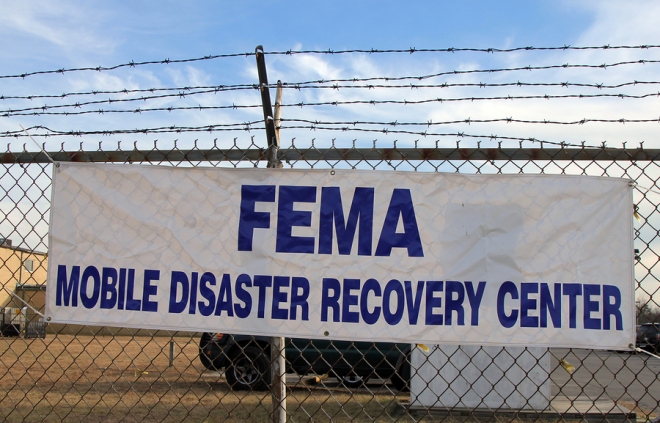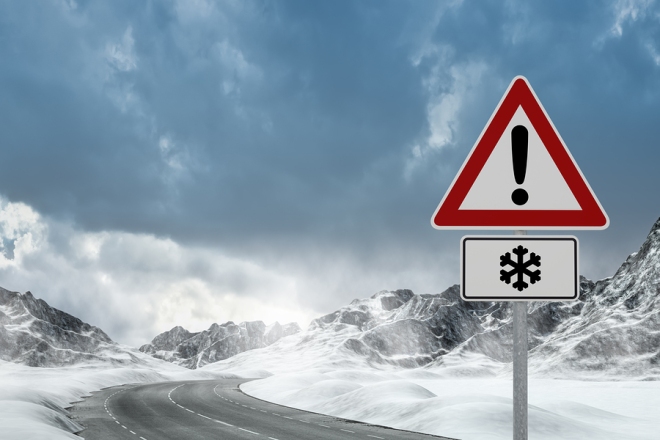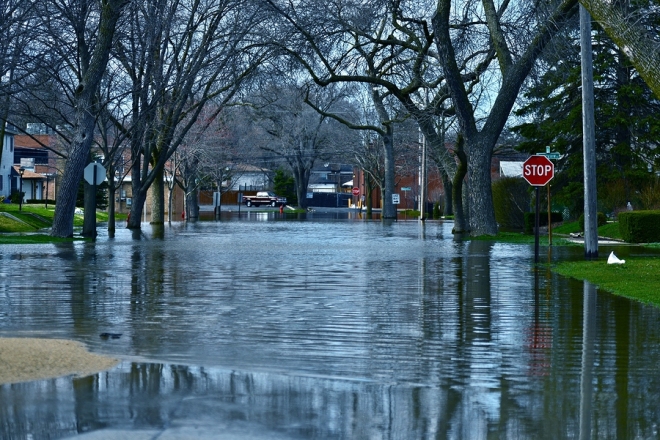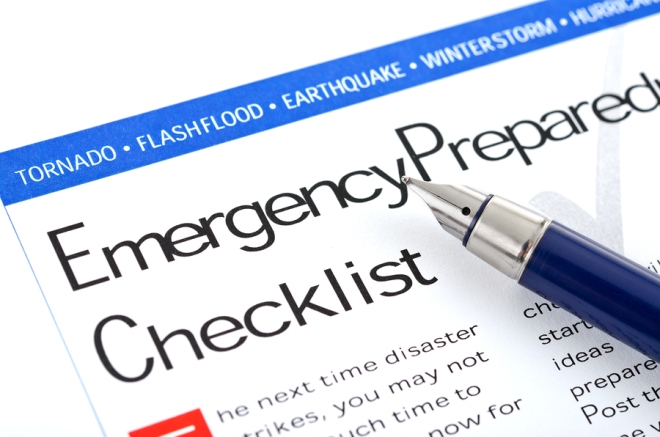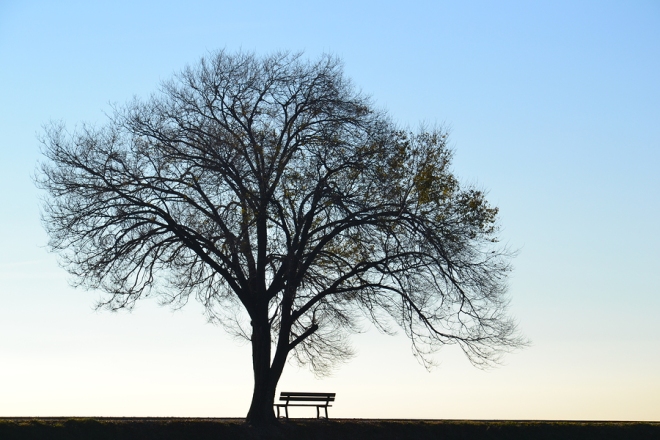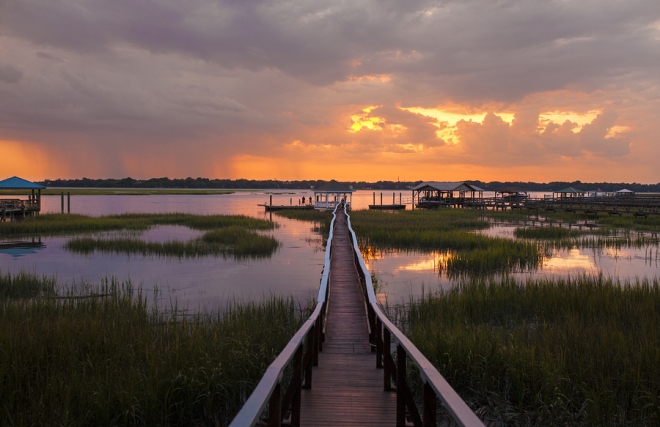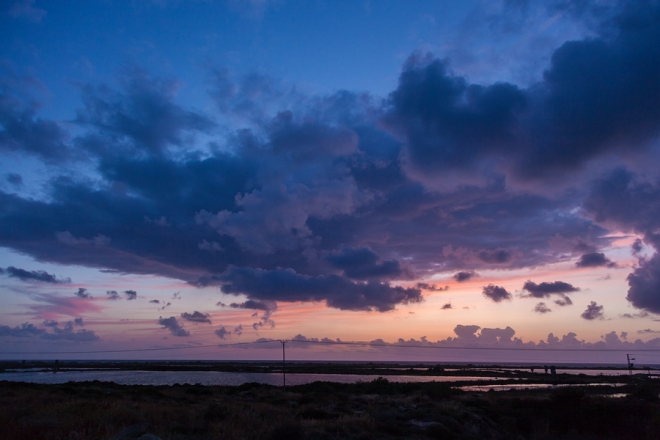
I opened my eyes to an overcast murky world that would not lift, foreshadowing reality: a world that would become too stark, too awful, too present, to bear or to escape. A light rain fell, winds gusting with deceptive lack of force, lulling one into false optimism, soon to be shattered.
I woke crumpled against the wall of a cold, overcrowded room smelling of cat, on the floor, wrapped in soft blankets I brought here, with my service dog clinging to my lap. There was pain, much pain, and I just wanted my own bed. My only goal was to get home and uncrumple myself in my sweet nest. The storm was over. There was no heat or electric. But I had lots of warm blankets at home and we would be just fine. So, I expressed my gratitude for the shelter, and headed happily away.
The rain was no intrusion to driving and the wind was a relief from stuffiness. I thought of strawberry ice cream in my freezer and decided to make it a special breakfast treat, rather than watch it melt away with the power outage. Whack! In front of me across the road, a tree: a wall of branches, now blocked the road. Looming fast, it was reality, right smack in front of me, looming fast. Something powerful happened to make this giant fall in such an undignified manner. I was jolted.
I could not turn right nor left, but turned around and found a street around the giant, broken and defeated. Suddenly the winds seemed stronger and the rain was more in my face. I squinted watchfully as I made my way along side streets strewn with branches. Driving south, trees across the road increased in frequency. They were like footprints to the deconstruction of my life
Coming down Willoughby Avenue, Merrick Road was the line of demarcation. Below Merrick Road the path of the water was devastating. Above Merrick Road, homes were untouched. I did not know. Most of us had no electric or television since yesterday, so we saw nothing that happened during the storm. I continued across Merrick Road, down Willoughby. At the postman’s house, the prettiest house in the neighborhood, just renovated last year, with 4 little girls sleeping inside, there was a huge tree across the road: fallen away from the house, not touching those on the other side. Around the corner a large curbside tree had torn through the living room roof and wall of the yellow cape cod with violets along the fence. White curtains, tangled in the branches in the wind, were tattered and filthy. I became aware of violence, and worried for little children. My car moved faster, past people I did not see. I pulled slowly in front of my modest green ranch house: all seemed intact, oddly silent. Neighbors were uncharacteristically standing clustered together, but I paid no attention. I was looking at the dark boggy earth that had become my front yard.
I backed into my driveway as I always did. The ground felt soft and slippery beneath me. I snuggled my car by the side door and sighed, secure. I was home! The storm was gone. How quickly we make assumptions based on what we want to believe. I did not notice the leaves and branches strewn across my yard. The cinder block wall that I built so many years ago was smashed against the north side of the house, in pieces. I was overwhelmed by the fury: I filled with fear. I picked up my cell phone to call my children, but realized they no longer lived close by. I sent an email describing what I saw, ending with, “I am afraid to go in,” not realizing how understated those words would become.
The ground had become spongy, a soggy black bog. There was a foul stench about the yard. Putrid black silt covered the back stoop, broken wall, and back door. I put the key into the lock and turned it gently. It was as if I was a stranger, the door was blocked against me. I pushed, but it did not budge. Puzzled, unable to enter my own home, I approached the front door. The metal storm door was bashed in, hanging in shards that tore the coat off my back. I pushed the metal inner door: it opened barely a few inches.
Furniture was piled against the door, placed there by a vile intruder, pernicious. I had to break into my own home, like a sneak thief in the night. Both entries were rudely barricaded by furniture. Nothing could have prepared me for the violence inside. It was like a tornado hit, but left the walls standing. My home, my sanctuary was shattered, disrespected, violated: my belongings torn, twisted, fractured, muddy, smeared, stinking, filthy, clotted, polluted, defiled, clumped into one horrific collage. I was appalled! I was horrified! I was afraid.
Black silt, brown residue, leaves, seaweed, muck, covered everything. My life welled up in my throat and poured from my eyes, gulping, gasping. It was my worst nightmare. The 48 inch cabinet television was thrown to the floor on top of the cable box, VCR/DVD player and Roku, all gifts from people who love me. My movies! I gasped. “Oh my God. Oh my God”. Everything in the room was somewhere else. My double memory foam hospital bed that took three men to carry into the house, was thrown across the room like a toy. A gallon jug of vinegar that was by the back door was thrown against the north living room wall. The couch, the love-seat, hassock and my bed were soaked with slimy seawater and stinking sewage. Fifteen tanks full of oxygen were flung about the rooms and propelled down the hall amid macerated sea plants. A thick brown trail of sewage wiped across my bed, the couch, through the electronic equipment, and grossly down the hallway to the bedrooms and bathroom. There was the acrid smell of fire. I was choking, wheezing, smothering from the oppressive air.
My fluffy white service dog jumped from my arms onto our precious bed, strewn with pillow pets she loved. I gasped and grabbed her from the vile polluted mess that had been my comfort, my solace from the pain, yesterday. Baby pictures, birthday cards, reference books I used in my writing every day, scores of classic movies, vital papers, vitamin bottles, leather folders, jewelry, unused check books, paper clips, lemon drops, fleece blankets and shirts, teddy bears, antiques, brass lamps, houseplants, Florida sea shells, couch pillows with pictures of bunnies and teddy bears, were smeared with sewage and strewn about the room. My honey oak desk drawers were dashed, broken: filled with water, filled with tiny treasures, special papers and poop. My emotions ruptured across the fetid mess before me. I sobbed uncontrollably, mumbling to myself over and over, “It’s gone. All gone. I lost everything. It’s all gone.” Over and over throughout the rooms i heard my voice. The violence in that room was terrifying. My cell phone rang. All I could say was, “It’s gone. All gone. I lost everything.” I don’t know who was listening.
The floor was slimy and gritty all at once. I was devastated. I was destroyed. I was appalled. The house smelled pungent, acrid. I was nauseous. My eyes were flaming coals ignited by the stench. I was numb, operating in slow motion. I screamed, but no sound came from me. I was in someone else’s nightmare, not my own. I was alone. I was not there at all. The smell was smothering me.
I saw pink glittering through the slime in front of me where a box of my tiny treasures smashed to splinters. I reached into the muck and grasped a smooth hard rock. It was a small quartz cross my son gave me many years before. I grasped the contaminated artifact to my heart and sobbed without shame. The world was too much with me.
There was no place to walk, nothing to touch that was not foul and nasty, contaminated. This was my home! The floors of the halls from the toilet to the living room couch were encrusted with thick brown residue, smeared up the walls and on the furniture. All of the bedroom doors were also blocked with furniture. The floors in the halls were torn up, splintered and shattered, strewn with plant life. My manual wheelchair was lying dead on the floor: reeking and drenched. The Everest and Jennings semi-recliner was a prize: I kept it like new because they don’t make semi-recliners anymore and that is what I need. The door to the linen closet was open: bedding and towels three feet up were soaked and soiled. Under the bottom shelf a Jacuzzi portable whirlpool was ruined in its box. So many hours this machine had eased my pain.
The bedroom next to the bathroom is my office, where my computers, copy machine and office equipment, and a multitude of irreplaceable documents are kept: my writings for 55 years, my poetry and notes for books in progress; documentation for 35 years of work as an advocate for disabled individuals and as a Consultant for Equal Access; architect’s plans and photos for access projects completed; my medical records. All of these documents were tucked away in plastic bins or fireproof boxes in large locked metal cabinets and locked steel file cabinets around the room, next to an oak computer desk, a maple desk, and my $7,000 computerized traction bed.
The room was in shambles, like someone had ransacked it. Locked fireproof boxes were tossed across the room like paper bags, turned upside down, full of water. Locked cabinets and desk drawers were dripping: opened gushing putrid water. Plastic totes were full of brown slimy water: documents floating, clotted and illegible. There was no crevice that this insidious slime did not breach. I was incredulous. Most of my irreplaceable documentation was lost. My heart stopped. It was like my work, a vital part of my life, ME, never existed. I was bankrupt!
Near the door was a stack of clear totes. I was in the process of reorganizing my winter clothes. The unused totes were full of sewage water: the clothes were wet and fouled, clumped on the floor. Office supplies, a laptop, two portable hard drives, copy machine, CD rewriter, DVD player, four typewriters, intermingled with clothes, bedding, shoes, brand new pants and fleece from Lands End, toiletries, computer programs, camera bags, suitcases, and a box of books on what to eat for Cancer purchased from Amazon and not yet read. Strewn about was anything that floated by and was ensnared by this gross collage.
My life-long desks, pristine solid wood, drawers swollen shut, cemented against me, to be broken into with tools of destruction, would reveal putrid clotted vital documents devoid of recognizability or purpose. The terror throughout my house was tearing large chunks from my flesh and leaving me hemorrhaging into the rancid muck. On the floor I noticed my tiny Gund teddy bear, fallen from great heights, gulping sewage, staring up at me, oozing dung, lost and alone.
My hand reached out to him, until I saw my computerized traction bed, covered with stuffed animals, ruffled pillows and pretty flowered comforters, like a quagmire oozing slop into its sophisticated mechanisms. I knew then that relief from spinal pain, comfort as I had known it, would never be the same. I lost my lifeline to normalcy. I had lost medical equipment that I could never replace in my lifetime. I laid my face upon the foul and putrid bedspread, caressing yesterday, and wept to exhaustion. All at once I felt hopeless, panicked and numb.
The middle bedroom was a storehouse of my professional books, stored pedantically in briefcases on a rolling cart for easy use. Over 35 years I had amassed a library to rival institutions. All were gone, in the flash of a sewage surge: all saturated and unreadable. I saw the color of my blood oozing into the debris below and I was weakened with its letting.
Large bins of medical equipment I use every day were overturned and filled with gunk: traction accessories, a multitude of electrical devices for heating and cooling, massagers, two leg braces, passive night braces and heel pillows, an Ultrasound unit, Air Circulation Legs, two passive exercise machines, and on and on: an arsenal to ward off pain and deterioration, soaked, slimy, ruined. I couldn’t think, or feel or cry anymore. it was as if something broke inside of me. I was defeated, destitute, shattered. More winter fleece and pants were one huge clotted mass, a spongy bog wrapping itself around smeared paper pages and electrical cords. Would I ever be warm again, or safe?
The master bedroom had a double bed, used when my children visit from out of state. The pastel patchwork bedspread was deceptively pretty, until I touched it: it turned to stinking gelatin. I bought this pillow-top mattress for my mom: it was expensive and comfortable. I wrapped it in plastic to protect it from potential spills. Now it was a balloon full of water, waiting to burst. As we all experienced with our protective totes and plastic covers, the water rushed in and did not drain away. There was no way to stay the waters of destruction from their pernicious course. We are mere tinder, tossed about by willful tides.
My honey maple cabinet sewing machine of 50 years was next to the bed. I used it to make my clothes, baby clothes, drapes and pillows, everything, including beautiful Raggedy Ann and Andy dolls with pink cheeks and a real heart. Ruined! My sewing chest filled with accessories collected through the years, and patchwork patches saved from special garments over the years, pretty lace in various colors, flower appliqués and spools of thread, was filled with sewer water, to the tiniest thimble, was spitting straight pins onto the ruptured floor. My parents gave me this cherry chest for my birthday when I was 16. My mom bought this house I bought from her when I was 21. Gone! All gone! How fragile is one life passing by.
Two oxygen concentrators and a portable oxygen machine sat on the other side of the bed dripping sea water and silt. It was incomprehensible to me that I lost most of my medical equipment. I didn’t know what to do. I was paralyzed with fear. How would I survive? I had taken such good care of the equipment, and still it was gone, all gone: through no fault of my own. Could I survive? I had no answers. I was impotent.
Two passive exercise machines were flat on the floor, tossed there by the tides, soggy and rusting. And then I saw the most gross indignity. My power wheelchair, smeared and stained with feces, upholstery saturated, mechanisms dripping: spent. I could not wrap my mind around this loss. I could only remember me and my service dog riding through malls, on boardwalks and into meetings, so grateful to be doing it on our own. I could not see, for all the tears were blinding me. I knew that I had lost too much right here. I mumbled weakly, “It’s gone. All gone.” No one was listening. Thousands lost everything in this “Super Storm,” dubbed a National Disaster: that would leave thousands upon thousands destitute, and the government listening with ears clogged by fiscal crisis. It would become survival of the fittest: with no help for the weak. It would become a National Tragedy, like Hurricane Katrina. I must be strong. I was hemorrhaging. Life was ebbing from me.
I fought the tears and vowed not to be a victim of this loss. But then I saw my Christmas tree strewn across the floor, lying passive beneath books, knitting needles, pillows, broken glass, a laptop, and a kitchen pot. I remembered it standing tall with tinsel and sparking lights, year after year: hung with tiny toys saved from my children’s childhood, and any treasure that made my heart light up. Each ornament was a special memory invoked, endeared. and an accumulation of all the years and all the joy. My Christmas tree was a beacon of hope and joy and peace for me on cold winter nights. To see it sucking slime, it wasn’t right. I lost it yet again, and wept to exhaustion, unashamed, for my Christmas tree, my wheelchair, my hospital bed, my life. And I was done with crying for myself. All was lost and ruined and ugly. And I must find a way to salvage what I could of this my ebbing life. The stench of sewage, decay and fire all mixed together in this my house, was gagging me and I threw up.
In the hallway was a closet some use as a guest room: it fits a single bed. It gives access to the attic. I used this space for storage of functional tools: vacuum, large battery-operated hedge cutter, hedge cutters for the cemetery, a chain saw, George Foreman Grill, new Osterizer, Convection Oven, Brother Printer, sewing machine, fabrics, formal dresses and coats, my sons’ childhood memorabilia, textbooks and classic movies. Five-foot metal cabinets lined the walls. The first was office supplies: staplers of various sizes, computer and copy paper, stationary, presentation books, loose leafs, plastic pages, folios, folders, envelopes, computer programs, and computer bags. The second had small appliances, pots and pans and holiday dishes. The top shelves were a storehouse of emergency and holiday food, organized, and replaced at expiration. I was proud of my secret stash, handy for unexpected guests: neatly tucked away.
I remember a number of times I went into this closet while the worst of a wind storm passed by, because it was in the center of the house surrounded by rooms: sheltered, protected. It seemed to me the safest place in the house. During Hurricane Sandy, this room gulped in and retained water like a thirsty fish tank. It became a tangled mass of necessary items made worthless, locked away or not. With loss piling upon loss, I became most painfully aware that nothing was safe or secure from this insidious Monster Storm that raped my home. And, no matter how much you do the right thing or prepare for a secure future, it can all be torn away in a millisecond by a force of nature, and you are alone, bleeding and unclothed. All of my plans and dreams, all my props and crutches, were torn away, I was lying in a pile of dung, anonymous. I was exhausted.
As I turned the corner, I glanced toward the bathroom that had puked this revolting indignity across my treasures. Its mouth was open wide and stained brown, from spewing excrement down my hall: reeking, festering, spreading plague. I was not prepared to forgive the unforgivable, so I moved on, dazed and overwhelmed.
As I passed by my bed, leaving, I longed to lie down and make my spinal pain go away. I wanted so badly to be comfortable: to reclaim my hospital bed, call this storm a fraud, tear these horrific images from my memory. I ached for yesterday. I feared that I would never be that comfortable again. I doubled over sobbing hysterically for all that was lost, for the innocence of my cloistered world that I could never regain. I was aware and alone. But I still had no way of understanding the terrible awfulness of being disabled during disaster.
I left the house through the kitchen, the route I customarily used to enter my home of 48 years. Cabinet doors were open, and expensive stainless steel cookware and appliances were scattered and pummeled, thickly crusted with feces. I was nauseated. My brand new ceramic top kitchen stove that my son and his wife had just given me was ajar and full of water. I gasped in disbelief. Why did I think that my appliances would survive? I was a vessel taking on the waters of injustice. There was too much destruction to calculate, and there would be no recourse to recompense the loss. I knew that I would never in my lifetime have anything so elegant again. It was leveling. I was numb.
And so it went, loss upon loss: stove, refrigerator, dishwasher, dryer, washer, commercial freezer, and microwave, all filled with filthy water, all ruined in one rush of fickle fate. My kitchen, my cooking, Christmas dinner putrefying in the freezer, all gone. Mom was made effectively inoperable. Grit, leaves, silt, feces and slime was dragged across the floor and into every receptacle: violated. I could no longer cry.
I followed the stinking trail of debris from receding waters, through the foyer and out the side door. Turning to look back, I witnessed the gross course of destruction made by raging water battering the doors open, hours before. I was amazed at the difference a moment can make. I was raw, exposed, and vulnerable. I vomited up the stench of my house: the putrid, acrid, nauseating, smothering, tearing smell of armageddon, my comfortable nest! I gulped the damp musty air outside and was overwhelmed by its freshness.


